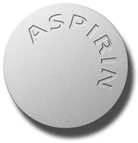 Findings from two new studies, published online on Aug. 27 in the Journal of Clinical Oncology speak to aspirin’s positive impact on cancer risk and mortality for men with prostate cancer. However, there was no significant reduction in the risk for developing breast cancer when using aspirin.
Findings from two new studies, published online on Aug. 27 in the Journal of Clinical Oncology speak to aspirin’s positive impact on cancer risk and mortality for men with prostate cancer. However, there was no significant reduction in the risk for developing breast cancer when using aspirin.
“These were different types of studies,” explained Dr. Stanley Liauw, author of the prostate cancer study and an associate professor in the department of radiation and cellular oncology at the University of Chicago Medical Center. “The breast cancer group was looking at how aspirin might affect new formations of cancer, while we looked at how it might inhibit cancer progression. We’re also talking about different disease sites,” he added, “which may involve different pathways. So, it’s possible that aspirin might affect these pathways differently.”
“But there is some rationale, based on previous research, for why we might expect to see an aspirin benefit,” Liauw added. “And for our study looking at prostate cancer death we actually saw a pretty dramatic effect.”
The breast cancer research team, was led by Dr. Xuehong Zhang, an instructor in medicine at Brigham and Women’s Hospital in Boston. Between 1980 and 2008, the team tracked nearly 85,000 postmenopausal women, all of whom were working as registered nurses when the study first launched.
The women completed questionnaires on their medical histories and lifestyle about every two years. All were asked about their routine use of aspirin and/or other NSAIDS.
Over the course of three decades, more than 4,700 of the women developed some form of invasive breast cancer. Yet, Dr. Zhang’s team found that neither regular aspirin nor other NSAIDs had any significant impact on overall breast cancer risk, regardless of how much they were used.
Meanwhile, Dr.Liauw and his team explored the potential benefit of aspirin use among nearly 6,000 men diagnosed with, and undergoing treatment for, prostate cancer.The men came from 41 different health centers across the United States, and all had undergone either surgery (radical prostatectomy) or radiotherapy.
The team noted that 37 percent of the patients were already taking some type of anticoagulant (aspirin, warfarin (Coumadin), clopidogrel (Plavix), and/or enoxaparin). No aspirin or other anticoagulant was prescribed once the study began.
After more than 10 years of follow-up, the team found that among those taking some type of anticoagulant, the risk of dying from prostate cancer was significantly lower than it was among those not taking one.Further analysis revealed that most of the benefit came from aspirin use, which Liauw said was responsible for a 57 percent reduction in the risk of prostate cancer death.
Because dosage information was not collected, no conclusions could be drawn about exactly how much aspirin was most beneficial. However, the team noted that the protective effect was strongest among patients with particularly “high-risk” disease.
Both study teams said that more research is needed to confirm their respective findings. And neither study proved a cause-and-effect relationship between aspirin use and its effect on cancer.
SOURCES: Stanley Liauw, M.D., associate professor, department of radiation and cellular oncology, University of Chicago Medical Center; Xuehong Zhang, M.D., Sc.D., instructor, medicine, Brigham and Women’s Hospital and Harvard Medical School, Channing Laboratory, Boston; Aug. 27, 2012, Journal of Clinical Oncology, online
 Findings from two new studies, published online on Aug. 27 in the Journal of Clinical Oncology speak to aspirin’s positive impact on cancer risk and mortality for men with prostate cancer. However, there was no significant reduction in the risk for developing breast cancer when using aspirin.
Findings from two new studies, published online on Aug. 27 in the Journal of Clinical Oncology speak to aspirin’s positive impact on cancer risk and mortality for men with prostate cancer. However, there was no significant reduction in the risk for developing breast cancer when using aspirin.
